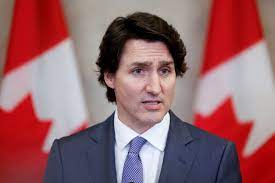
 A television camera monitor displays Vladimir Putin, Russia’s President, during his annual news conference in Moscow, Russia.
A television camera monitor displays Vladimir Putin, Russia’s President, during his annual news conference in Moscow, Russia.
Russia is continuing to build up forces close to Ukraine even as it’s preparing for security talks with the U.S., keeping up pressure with a deployment that could turn into a rapid invasion or a long-term threat.The three largest telecommunications companies all offer RT to their television subscribers, according to their websites. Spokespeople for those companies — Rogers Communications Inc., Telus Corp. and BCE Inc. — did not immediately respond to requests for comment outside of regular business hours.
RT and other state-funded media outlets such as Sputnik are active participants in advancing Russian President Vladimir Putin’s geopolitical agenda, according to a paper published by the U.S. State Department in January.
MORE: U.S., EU Cut Some Russian Banks From SWIFT, Target Central Bank
“RT and Sputnik’s role as disinformation and propaganda outlets is most obvious when they report on issues of political importance to the Kremlin,” said the report from the department’s Global Engagement Center. “A prevalent example is Russia’s use of RT and Sputnik to attempt to change public opinions about Ukraine in Europe, the United States, and as far away as Latin America.”
Paula Simons, a member of Canada’s Senate, said she would be meeting with the country’s broadcast regulator on Monday to ask questions about RT. A 2017 probe by the Globe and Mail newspaper found that Canada’s cable companies were in some cases being paid by an affiliate of RT to carry the channel. At the time, it was estimated that RT reached between 6 million and 7 million Canadian households.
Canada has an estimated 1.3 million people of Ukrainian descent, including one of the most powerful members of the government, Deputy Prime Minister Chrystia Freeland. Freeland and Prime Minister Justin Trudeau announced multiple rounds of sanctions on Russia and Putin in response to the invasion and have openly backed the idea of cutting Russian entities out of the SWIFT financial messaging system that facilitates trillions of dollars in transactions.





